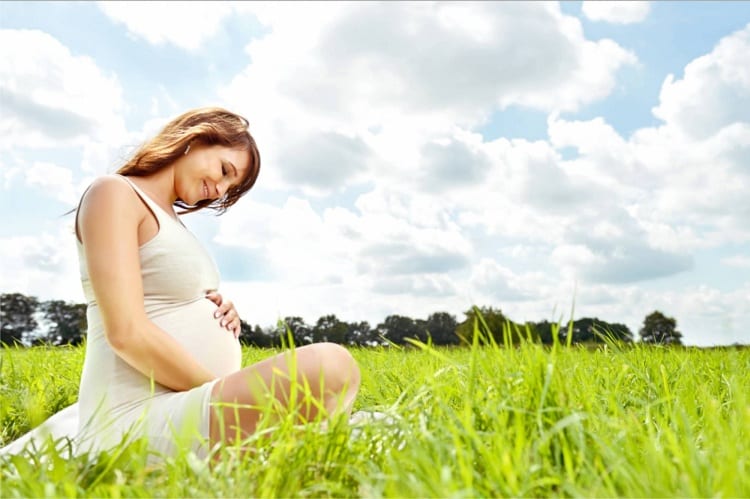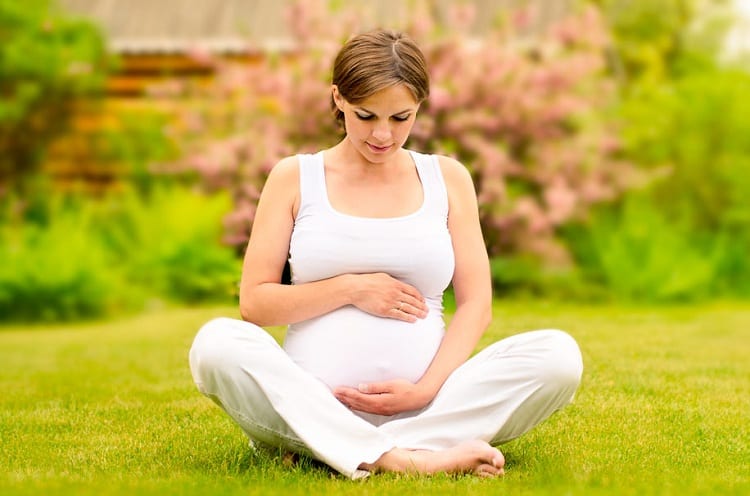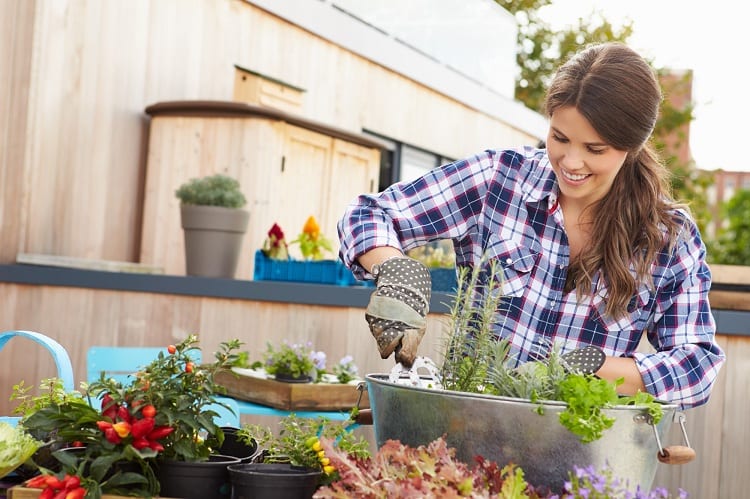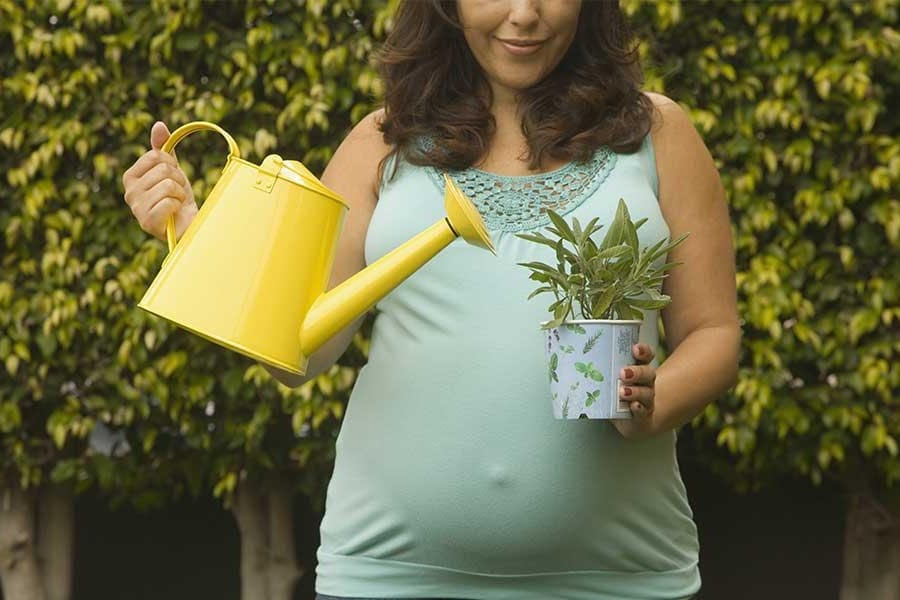As soon as a woman becomes pregnant, it seems there’s a never-ending list of things she can no longer enjoy.
Eating soft cheese, having a bite of sushi, drinking a glass of wine, or going to the amusement park for a day of fun.
For the expectant mother who loves to garden, does this mean her favorite pastime is now off the table as well?
No, thankfully, as long as she follows some rules and keeps herself protected, there’s no need for a pregnant woman to worry about gardening while she’s carrying her child.
How do you garden safely while pregnant, then?
A pregnant woman wanting to get into the garden should follow the same precautions as everyone else with a few extra cares.
You’ll need to always wear gloves, have adequate sun protection for your whole body and face, stay hydrated, and not handle any toxic chemicals or products that could harm you or your baby.
There are loads of benefits to be enjoyed through gardening, especially for a pregnant woman, so there’s no need to stop now.
We’ll walk you through the ins and outs of gardening while pregnant, the potential risks, and how to do it safely, so you can feel peace of mind while getting out in the garden.
Table of Contents
Is Gardening Safe for Pregnant Women?

Gardening is a great hobby loved by millions, and if you’re someone who considers themselves a green thumb, that doesn’t have to change just because you’re pregnant.
Contrary to some people’s beliefs, there’s nothing wrong with getting into the garden when pregnant, and in fact, it offers a load of benefits for the expectant mother.
The biggest benefit it has to offer is relaxation which can be especially helpful during pregnancy.
With all of the stresses about the upcoming birth and motherhood, as well as restless sleep and pregnancy insomnia, it’s a great way to take your mind off everything and get into nature.
Another huge benefit is physical exercise which is essential during pregnancy. You might find that other activities you used to do are no longer available to you, so replacing them with a few regular sessions in the garden each week is a great alternative.
Just be careful with things like bending and squatting, as you’re probably aware that your body feels different these days.
Although there’s a lot to benefit from, you also have to be careful, as the risks are now higher because you’re carrying a baby.
Make sure you’re aware of hazards in the garden and have adequate protection, so you can continue to enjoy the advantages of being in the outdoors and your favorite hobby.
Potential Dangers in the Garden

The garden is known as a source of relaxation and enjoyment for many, but the serious gardener knows it’s also the home to some potential dangers.
When you’re pregnant, you no longer just have yourself to look out for, so you need to educate yourself on what could possibly go wrong while gardening.
- Toxoplasmosis: This condition occurs when the toxoplasma gondii parasite has infected the soil, which usually spreads through the feces of an infected cat. For pregnant women, this condition is extremely serious, as it can lead to mental disabilities and blindness in the fetus, as well as flu-like symptoms for the mother.
- Listeria: Listeria is a bacterium found in soil and when ingested, it can lead to miscarriage or infection for your unborn baby. Keep hands protected with gloves and clean all food and plants thoroughly that come from the earth so that the bacteria can be washed away effectively.
- Sunburn and heatstroke: Being in the sun longer than 20 minutes is all it takes to develop heatstroke and sunburn. When pregnant, this is more hazardous, so you must have adequate protection from head to toe, and stay in the shade as much as possible.
- Dehydration: A pregnant woman requires more water each day than their non-pregnant counterparts, and this is especially important during physical activity like gardening. Keep a water bottle with you at all times and take regular sips to avoid dehydration.
- Chemical ingestion: Accidentally inhaling or ingesting chemicals poses a serious risk when pregnant to your unborn baby. Chemicals can be found in the soil or in gardening products like sprays and fertilizers, so be careful when handling anything.
- Infections: An infection could come from getting a cut on a thorn to inhaling or ingesting chemicals found in herbicides and pesticides. Be careful when dealing with anything that could lead to an infection, especially while pregnant.
Being Safe and Prepared for Pregnancy

You don’t have to ditch your favorite hobby just because you’re expecting, but you do need to be careful.
As with any other task you do while pregnant, gardening will require some additional planning and preparation, so follow these tips to make sure it’s done with care.
- Invest in a good pair of gardening gloves that will protect not just your hands, but your wrists and forearms as well. Something durable that ensures nothing can get to your skin.
- When you’re done gardening, give your hands and arms a thorough wash, or better still, have a hot shower. Avoid touching your face with gloves while in the garden and get into the habit of keeping hands away until they’re clean.
- Have a regular break every half an hour and make sure you’re eating and drinking plenty of water. Pregnant women require more hydration during this time and especially if you’ve been working outside in the garden.
- You may have to limit yourself and not do as much as you’re used to doing, so stick to the simple parts of gardening. It’s not safe to haul rocks or deal with heavy loads, so don’t attempt anything silly.
- If you’re growing fruits and vegetables, make sure you clean them well and cook them before eating. During pregnancy, the risk of listeria is heightened and these types of fresh produce are where it’ll be found.
- Ask friends and family for help when dealing with parts of gardening that are no longer safe. This includes heavy lifting or the application of certain gardening chemicals.
The Ideal Hobby for Pregnancy

If there’s ever a time in life when we need the relaxation and satisfaction that a good spot of gardening brings, it’s during pregnancy.
When most of our favorite hobbies and foods have been stripped from us, knowing we can still safely get out into the garden to enjoy this rewarding pastime is something to look forward to.
Gardening comes with risks for everyone, even if it appears on the surface to be a harmless hobby.
When you’re pregnant especially, you’re more at risk for developing certain conditions, and you have to consider your unborn baby as well, so it becomes even riskier.
With the right preparation and protection for your body, you can do just as much as you used to in the garden and reap all of the usual rewards.
Gardening is a great way to pass the time, get the all-important vitamin D your body needs, and stay relaxed and occupied during the journey from pregnancy to motherhood.
Related Questions
Gardening is a wonderful hobby to have, no matter your age or other interests.
When you’re pregnant, there’s nothing better than getting out into nature and relaxing with a spot of gardening, as long as you do it safely.
If you’re wondering about other safe practices to follow while you get your greenthumb on, we’ve answered some frequently asked questions to help you out.
Although known as a relaxing habit, potential hazards are lurking in the garden which you need to be protected against.
Chemicals, poisonous plants, heatstroke and sunburn, tetanus from sharp objects and soil, Lyme disease, and strains and sprains on your back and neck all need to be accounted for when you start gardening.
In most cases, it’s safe not to wear a mask while gardening, unless working with a specific product that recommends to.
Airborne chemicals and bacteria can be found even outdoors, and these can come from pesticides and herbicides, soil, and the earth itself, so it’s important to remain vigilant.
There are contents in potting mix that can lead to illness, including fungi and bacteria, with conditions like Legionnaires disease being the main concern.
When handling a potting mix of any kind, it’s imperative to wear gloves to protect your hands, and if you want to protect yourself further, you can wear a mask as well.
Recourses:

